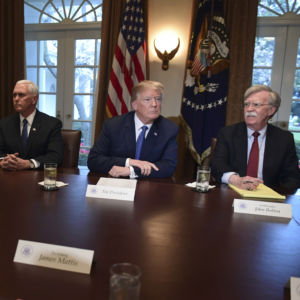SEOUL — In our obsession over prospects for peace on the Korean peninsula, it is easy to forget what may be a more immediate, more serious clash of regional and great powers 5,000 miles away.
That’s the rising confrontation between the United States, Russia and Iran over Syria. That oft-used phrase, “There are no good options,” applies perfectly to all the ways suggested for resolving that terrible war, in which hundreds of thousands have lost their lives and millions more have fled their homes, forced to seek shelter elsewhere in Syria or across the Mediterranean on journeys in which thousands have perished.
Now the use of chemical weapons by the hideous Bashar Assad regime has again taken the war to horrifying levels. The sight of hundreds dying or maimed or writhing in pain and terror from this evil form of warfare is a reminder of what the North Koreans might consider in a no-holds-barred conflict for the Korean peninsula.
We know North Korea has both chemical and biological weapons of mass destruction though they don’t seem to have come up as an issue while the United States and South Korea demand complete, verifiable, irreversible, denuclearization of the North’s nuclear program. Nor has Kim Jong-un threatened to annihilate his foes with them though he did plot the use of VX nerve agent to snuff out his brother-in-law Kim Jong-nam last year in Malaysia’s Kuala Lumpur airport.
If the Korean confrontation is on hold in the run-up to the summit between Kim and President Moon Jae-in on April 27 and maybe, just maybe, between Kim and President Trump next month, the one in Syria is on the verge of exploding. The Russians are making dire threats while Iran, a nascent nuclear power, backs the Assad regime like a blood brother in a contest for control of the Middle East.
It’s easy to say that punitive strike on Assad’s forces would be what he deserves to avenge the horror of the latest chemical attack and dissuade him from trying again. The fact is, however, that he’s got the Russians and Iranians firmly on his side, and there’s no telling what they might do after their bluster and bombast is said and done.
No two wars or crises are alike, but there’s an easy comparison between the standoff in the Middle East and that on the Korean peninsula. The North Koreans know they have China on their side. Yes, China’s President Xi Jinping, unlike Russia’s President Vladimir Putin, does not want conflict in Korea to escalate into another Korean War. The Chinese yearn for stability as Xi made clear to Kim during their great meeting in Beijing. It’s reasonable to assume, in fact, that Kim expressed his “willingness” to talk over his nuclear program with Moon and then Trump on the strong advice if not pressure from China.
Against this background, Trump and John Bolton, having just assumed his formal title of Trump’s national security adviser, have to forget a “military option” in the form of a quick strike against North Korea’s nuclear and missile facilities. Trump may not be happy with whatever deal Moon strikes with Kim, and he may not get what he wants from Kim, but we may be pretty sure he will be in no position to order an attack on the North that Defense Secretary Jim Mattis would oppose.
The Middle East is another matter. Trump has denounced the carefully negotiated multilateral deal under which Iran agreed to hold off on developing nuclear warheads, and he’s got Israel, a nuclear power in its own right, firmly on his side. He’s also got those heart-rending images of Syrians, young and old, writhing in unspeakable agony while attempting to wash off the terrible chemicals that Assad ordered used against them to wrest back territory that he’s lost in years of civil war against his cruel dictatorship.
The United States, however, faces another fear in the Middle East, a renascent Russia, anxious under Putin to revive the strength of the old Soviet empire that crashed nearly 30 years ago. Russia can make trouble for the United States and its NATO allies in eastern Europe, notably the Ukraine, and let us not forget Stalin’s Soviet Union was a prime supplier of weapons for the North Koreans in the Korean War. Russia under Putin can just as easily sidle up to the North Korean regime with promises of stuff to replace its Soviet-era planes and tanks.
For the United States, the worst nightmare would be a two-front war extending from the Middle East to northeast Asia. That’s a nightmare that Trump has to consider while embroiled in a trade war with China and one scandal after another in his own backyard.

